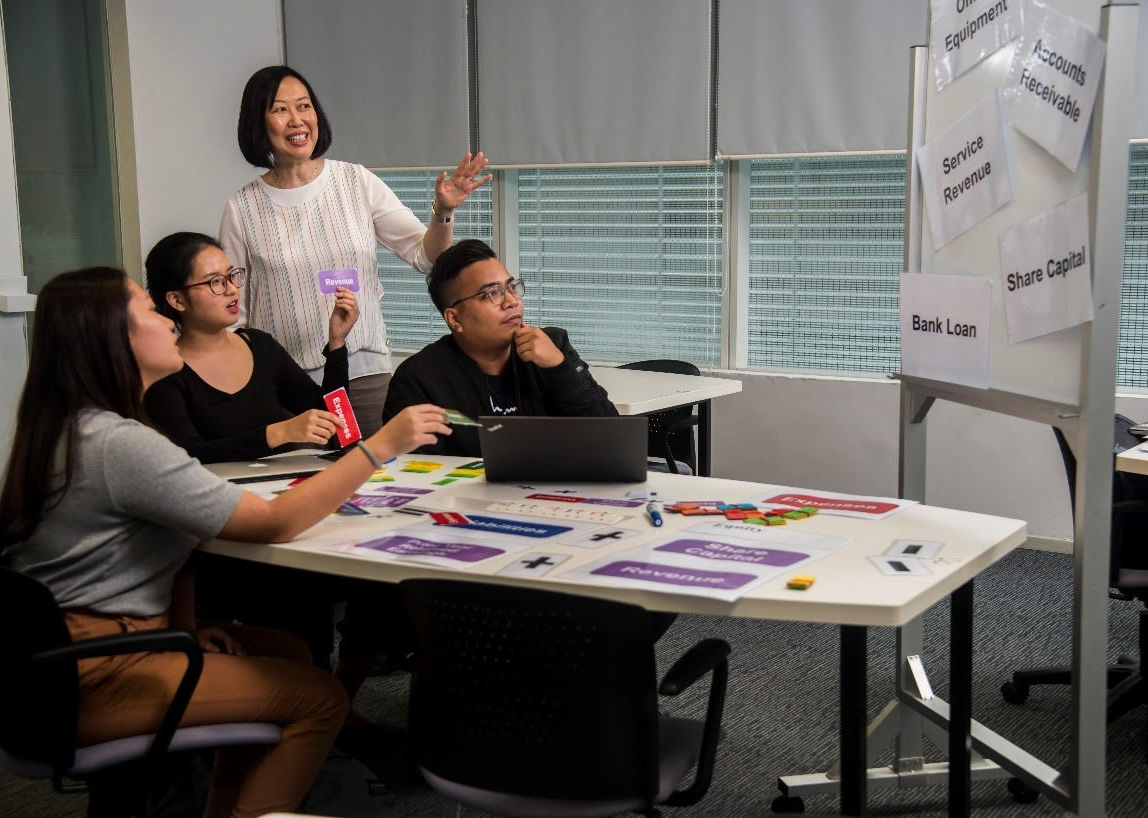Ms Siu Yee Nar Ella, Republic Polytechnic, President’s Award for Teachers 2019 Recipient
As a senior lecturer teaching Accounting at Republic Polytechnic (RP)’s School of Management and Communication, Ella Siu has a challenging job.
Before her students have even set foot into her class, they are already worried… about having to work with numbers, which is normally not their forte. Some students also do not see the relevance of the subject to their course of study or their lives.
From fear to fun
“People find accounting very difficult,” acknowledges Ella, saying that even adults are intimidated by the subject.
Ella’s first job is to remove the fear. “If students are fearful,” she says, “they will be disengaged.” She is empathetic, because she knows what it is like to be afraid of accounting.
When she was an undergraduate studying the subject, she felt lost during the first three months. “I couldn’t understand anything, and I panicked,” she says.
It was only during the tutorials, when the professor pressed Ella and her course mates to think about ‘why’ things were done in a certain way, that Ella realised learning accounting is not about memorising rules, but about understanding the underlying principles and patterns.
So, the first thing Ella tells her students is that it is all right to make mistakes — emphasising that this is what gets them thinking and learning.
Students also tend to be fearful about speaking up in class, so she makes sure that she welcomes all questions. “Whenever they ask a question, I will address it. No question is a silly question.”
“Even if an answer is far-fetched, I will still ask, ‘Why do you think this is important?’ And let them have the chance to articulate their reasons.”
As a result, her classrooms tend to be quite lively and her students like the fact that her classroom is not a judgmental place.
Ella also uses gameplay to make things fun. To teach the five basic accounting elements — assets, liabilities, revenue, expenses and equity — she affixes one card to the back of each student without the student knowing what it is. Only others can read the card. The card states an item like “laptop” or “salary”, and the students have to go around the class to ask each other one question at a time, such as, “Is the item an asset?”, “Is the item a balance-sheet item?”. The others can only answer “yes” or “no”, and the students have to guess the word on their backs. The team with the most number of correct guesses within a given time wins. Through the game, students get to think about how to
categorise accounting items meaningfully and get familiarised with these accounting items.
Engaging the students in learning
“In problem-based learning, we need to build on collaborative learning,” says Ella. “This means class discussions are very important, and if students are disengaged, they won’t participate in teamwork and discussions, and you will lose them.”
She uses collaborative learning to teach students how to expand the basic accounting
equation – ‘Assets minus Liability equal to Equity’. From this equation, they can expand it further to bring in how revenue, expenses, prior-year profits and dividends come into the picture. Ella gets the class to form groups and sets each team to work on expanding the formula.
After that, teams debate their solutions. “The students have to articulate their thoughts, and they will learn through argumentation,” she notes.
Ella also uses online platforms such as Wiki and Discussion forums to engage students who are more quiet in class and to encourage more active participation.
She once had a student who confided in her that she wasn’t interested in the module and hence had not participated in the class discussions.
To make the module content more relevant and interesting, Ella encouraged the class to research on financial frauds and share any thoughts and questions that they have. To Ella’s surprise, this particular student then proceeded to post questions in the discussion forum and even answered some questions raised by her peers. “I was heartened and pleasantly surprised.” In the next lesson, Ella commended the student for her effort and further discussed other students’ posts in class. From there, she noticed that this student who was initially quiet had grown to show more interest in the lessons, and was able to answer questions in class with more confidence.
The ‘Money’ Games
Teaching doesn’t only happen in class. Ella also gets her students to participate outside in ways that will strengthen their grasp of concepts. One such platform is the Financial Literacy for Youths (FLY) Race, which is an Amazing Race-type event organised by RP for secondary school students.
Participants have to race to various pop-up stations in RP, and take on challenges related to financial literacy, such as growing investments, protecting assets or managing credit card debt.
For example, at the credit tools station, participants are given a virtual credit card and they have to figure out if their spending can be sustained with a given salary, as well as understanding the consequence of late payment after they make a decision on whether to pay up in full or not.
RP students help to develop the games. They also run the stations as station masters. And they take pride in the work that they do. Ella also conducts research to evaluate the effectiveness of this program.
In a separate initiative, Ella worked with other lecturers at RP to develop a board game called Build Your Own Business. As the name suggests, it allows students to pick up ideas on running a business, including the up-keeping of accounts.
Making accounting relatable
Once, she visited a factory producing local desserts to interview the owner on the accounting problems he faced when he first started his business.
She says, “The business owner told us he didn’t know how to count the costs correctly. He said, ‘I set the price too low. I thought I was making a profit but in the end, after two months, I made a very big loss.’” The story brought home to students the real-world application of the importance of costing. She also took a video on the production process and the interview was developed into several problem statements for the Management Accounting module.
To help students understand the process of relevant costing decision-making, Ella developed an e-learning package with a simulation exercise that requires students to help a virtual character to choose between two guitars to buy. Through a series of questions, they find out about the character’s budget and the various cost considerations for the students to advise the character on what they think is the best decision.
Students also write in their Reflection Journals after every lesson. As a way to make the subject relevant to the lives of students, she will ask, for example, “From what you’ve learnt about budgeting today, how do you think you can help manage your family’s finances?”
In response, the students need to articulate how accounting can be applied in their lives, and impact the way they live. The Reflection Journals also help Ella to understand the challenges students face, which she can then use to reflect on how to improve on her teaching.
A sense of purpose
Apart from being a lecturer, Ella is also a mentor. In addition to providing a listening ear and a guiding hand, she has gotten the students involved in community service.
Ella worked with SunLove Seniors Activity Centre (Marsiling) on a project by which her students would organise monthly visits to the elderly staying in one-room flats. She started mobilising the students in 2014 by personally going with them for the first few visits, grouping them into different language / dialect groups, and guided the students to find out the needs of the elderly before utilising the funds allocated to the project. The students would spend time talking to and befriending the residents on a regular basis, who are usually elderly and living alone. “Besides participating in short-term volunteering events, this project requires the students to make a longer-term commitment to care for others,” notes Ella.
Ella encouraged her students to get involved in this project because she wanted her
students to think beyond themselves. “To be able to contribute to society helps the students develop a sense of purpose, and this would eventually help them to be a better person.” The project is still ongoing and the monthly visits are now organised by the students. In fact, one student from her first batch of mentees has since gone on to study social work and is graduating this year from the Singapore University of Social Sciences; another one of her mentees is going for an internship in a social enterprise with a mission to grant support to caregivers taking care of the elderly.






